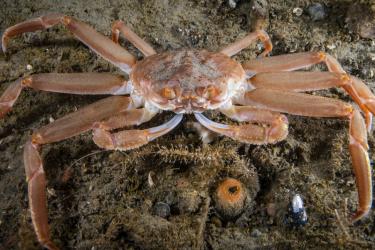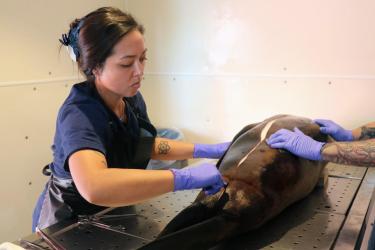The Marine Turtle Ecology & Assessment Program conducts research on marine turtles to further our understanding of their ecology, life history, human threats, and conservation status. In addition, we provide scientific advice and practical support to those who study, manage, and conserve marine turtles. We are involved with turtle research and conservation around the world, with an emphasis on the Pacific Ocean. The program focuses on five primary areas:
Marine Turtle Research
Our marine turtle research and conservation efforts primarily focus on four marine turtle species: green, loggerhead, hawksbill, and leatherback. We are working in partnership with governments, universities, private institutions, and local communities globally to build collaborative research programs and implement a coordinated recovery effort for all sea turtles species due to concerns over alarming and dramatic population declines.
Stable Isotope and Demography Laboratories
The Marine Turtle Ecology and Assessment Program has two laboratories at Southwest Fisheries Science Center. The first laboratory is the Stable Isotope Laboratory, an interdisciplinary stable isotope sample processing facility directed by Dr. Jeffrey Seminoff and managed by Garrett Lemons. The second laboratory is the Marine Turtle Demography Laboratory which is a multi-user facility directed by Dr. Cali Turner Tomaszewicz. The lab utilizes analysis of growth layers in sea turtle bones to study their age, growth patterns, habitat use and trophic ecology.
Marine Turtle Tagging
When it comes to marine turtle tagging, our researchers utilize biotelemetry techniques to study the movements and habitat use of marine turtles around the world. The telemetry tools that we use include Argos-linked GPS transmitters, Argos-only transmitters, acoustic transmitters with active and passive tracking systems, time-depth recorders, and turtle-borne video systems. Uniquely coded flipper tags and Passive Integrative Transponder (PIT) tags are used to identify individual turtles through time and obtain accurate estimates of life-history traits and population parameters.
Marine Turtle Stranding Response
Our marine turtle stranding team responds to dead strandings across San Diego, Orange, and Los Angeles counties. When possible, we bring the animals back to our laboratory where we conduct necropsies to determine the causes of death. Although we only respond to strandings within southern California, we store and analyze scientific samples taken from stranded turtles throughout the U.S. west coast.
Marine Turtle Outreach
We view marine turtle outreach and dissemination of information about turtle ecology and conservation as an integral part of our mission and are committed to engaging with the general public in a variety of educational efforts. Our scientist’s outreach activities include giving presentations at local clubs, societies and in classrooms, judging science fair presentations, giving tours, leading field outings, and participating in career panel.



